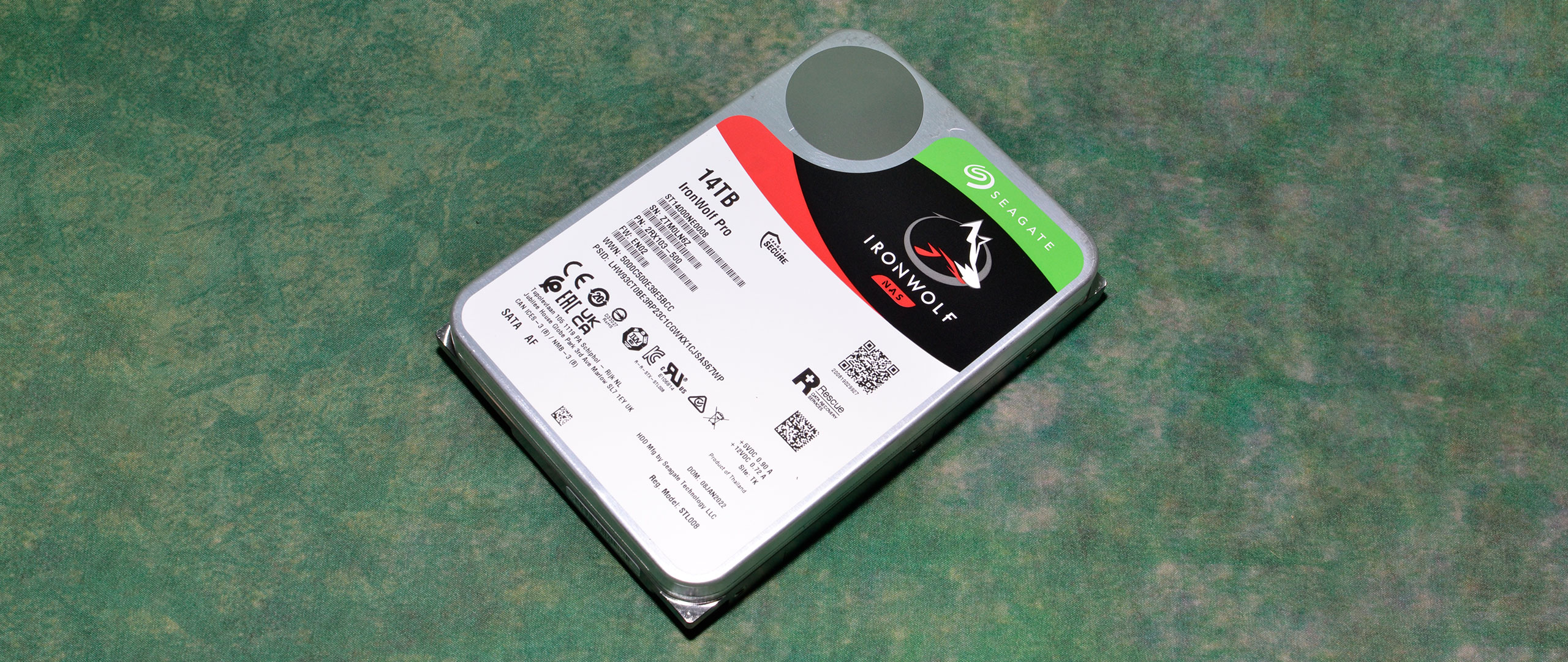Why you can trust Tom's Hardware
Comparison Products
We compared the 14TB Seagate IronWolf Pro to the 14TB Toshiba X300 and the 12TB WD Red Plus. We also included our suite of 8TB hard drives, including the 8TB WD Blue, the older HGST UltraStar He8, the Seagate IronWolf Pro 8TB, the Seagate FireCuda, and the Seagate BarraCuda. Larger 20TB drives in the test pool include the WD Red Pro, the Seagate Exos X20, the Seagate IronWolf Pro, and the Seagate SkyHawk AI.
Trace Testing - 3DMark Storage Benchmark
Built for gamers, 3DMark’s Storage Benchmark focuses on real-world gaming performance. Each round in this benchmark stresses storage based on gaming activities including loading games, saving progress, installing game files, and recording gameplay video streams.

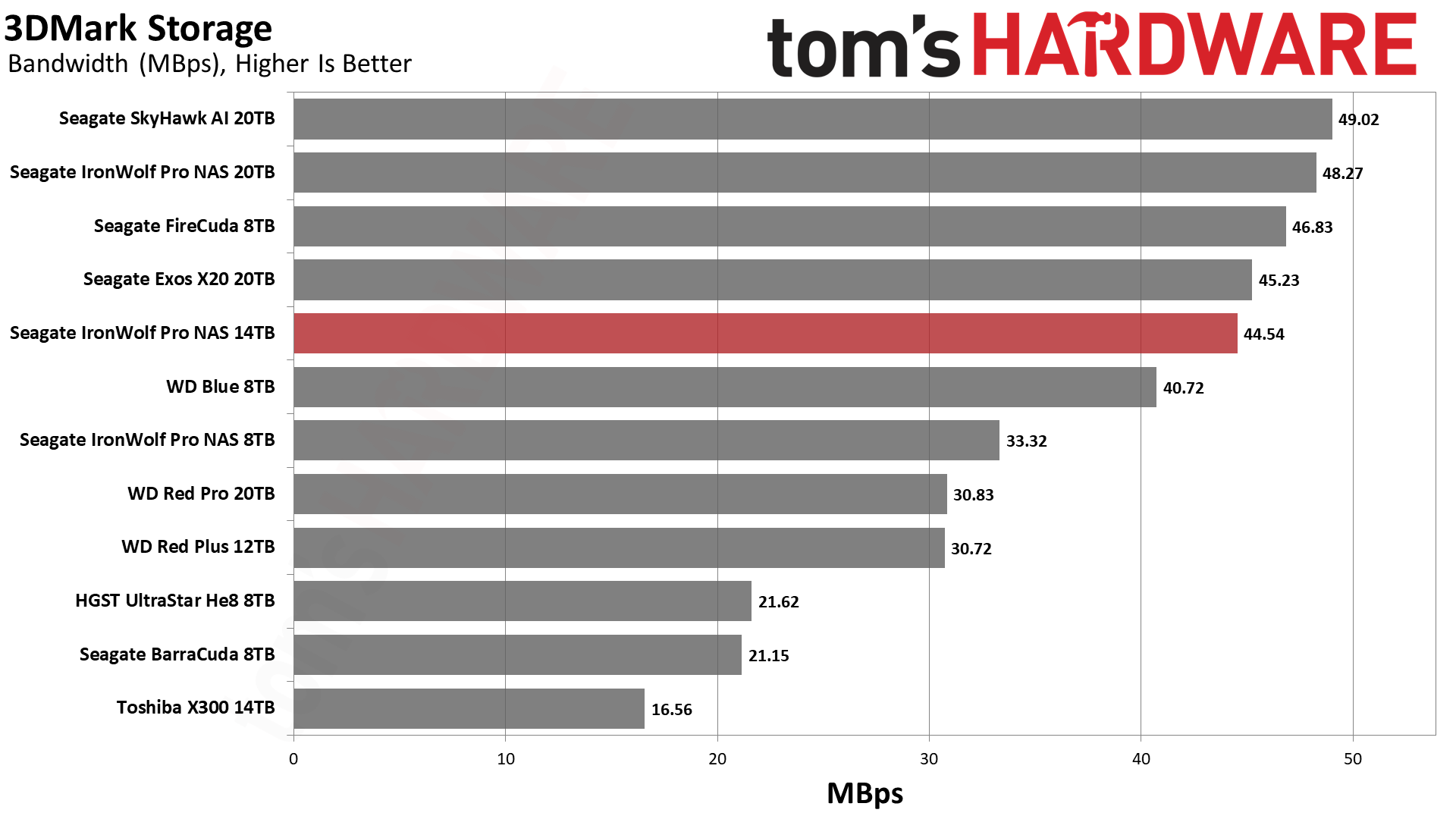

Any of the best SSDs on the market will provide far better performance in gaming applications. However, for those with voluminous game libraries, having a comparatively cheap and deep storage device with good-enough performance can be a win.
The IronWolf Pro is close to the top in 3DMark, although the FireCuda is the better deal for general performance. The downside is that it’s only available at 4TB and 8TB capacities.
Trace Testing – PCMark 10 Storage Benchmark
PCMark 10 is a trace-based benchmark that uses a wide-ranging set of real-world traces from popular applications and everyday tasks to measure the performance of storage devices.
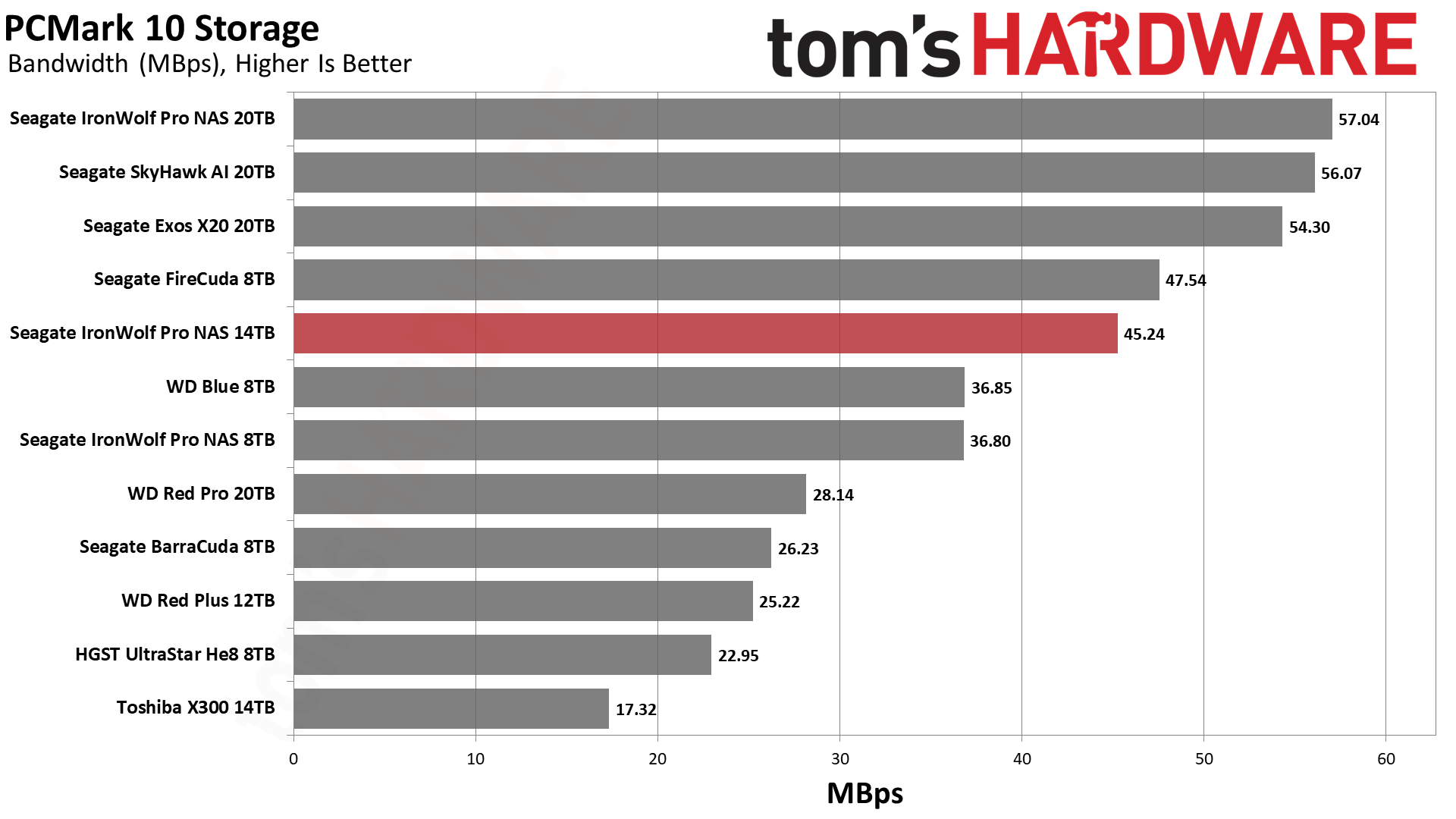
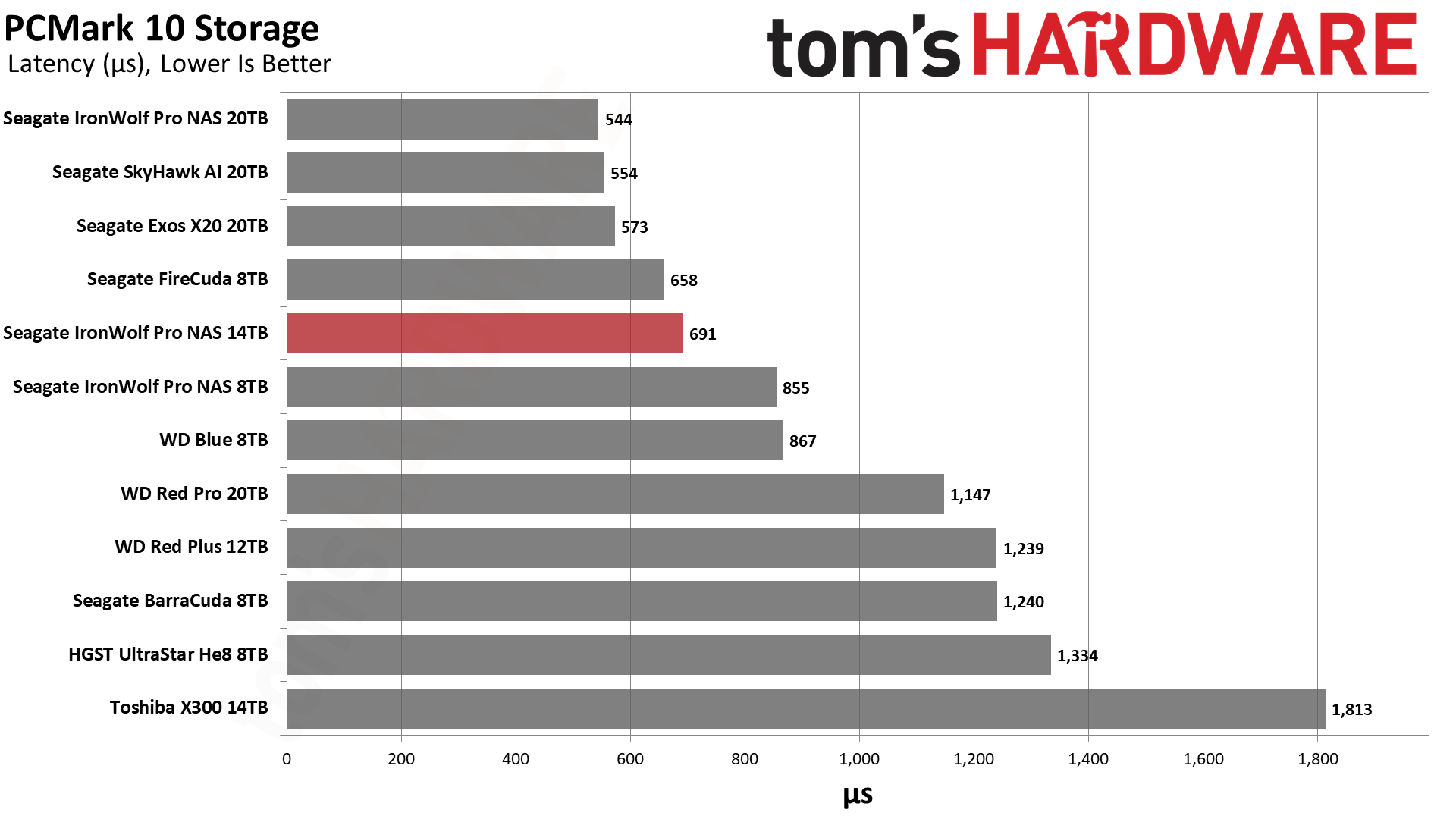
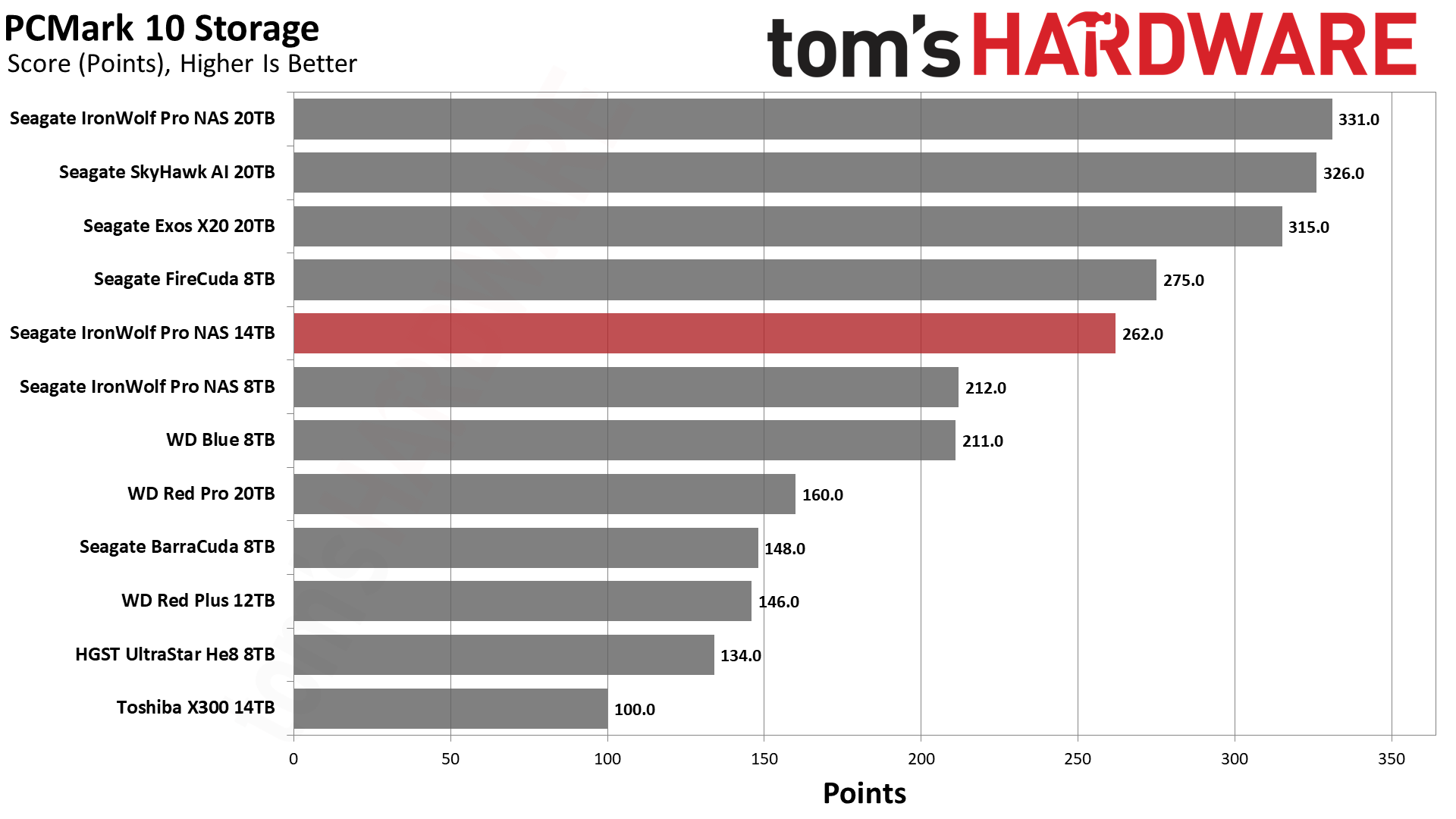
The IronWolf Pro doesn’t do as well in PCMark 10, but it is up against larger 20TB drives that have higher performance metrics. The exception is the FireCuda which, again, is an excellent HDD for desktop PCs.
Transfer Rates – DiskBench
We use the DiskBench storage benchmarking tool to test file transfer performance with a custom, 50GB dataset. We copy 31,227 files of various types, such as pictures, PDFs, and videos to a new folder and then follow-up with a reading test of a newly-written 6.5GB zip file.
Get Tom's Hardware's best news and in-depth reviews, straight to your inbox.
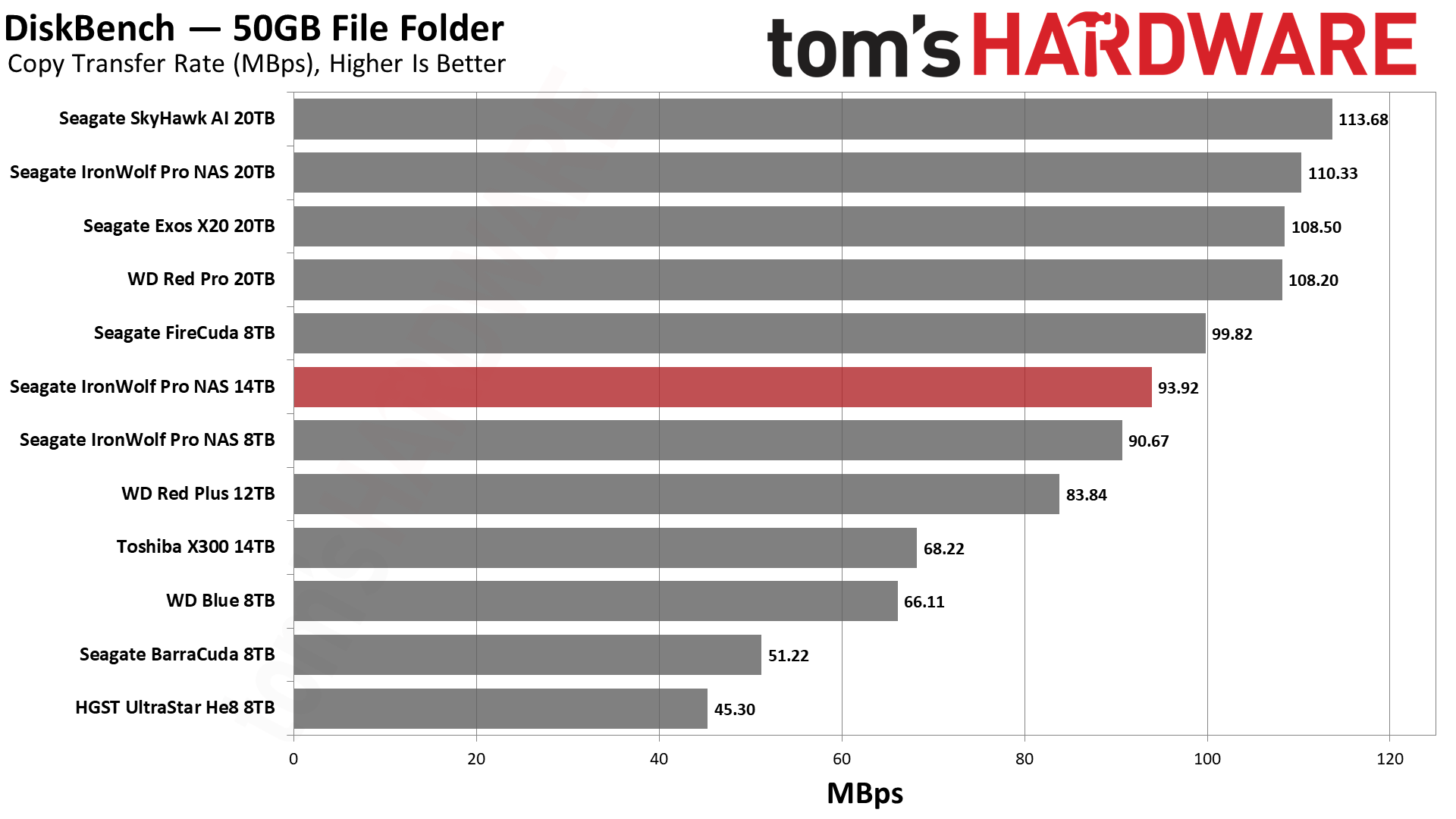
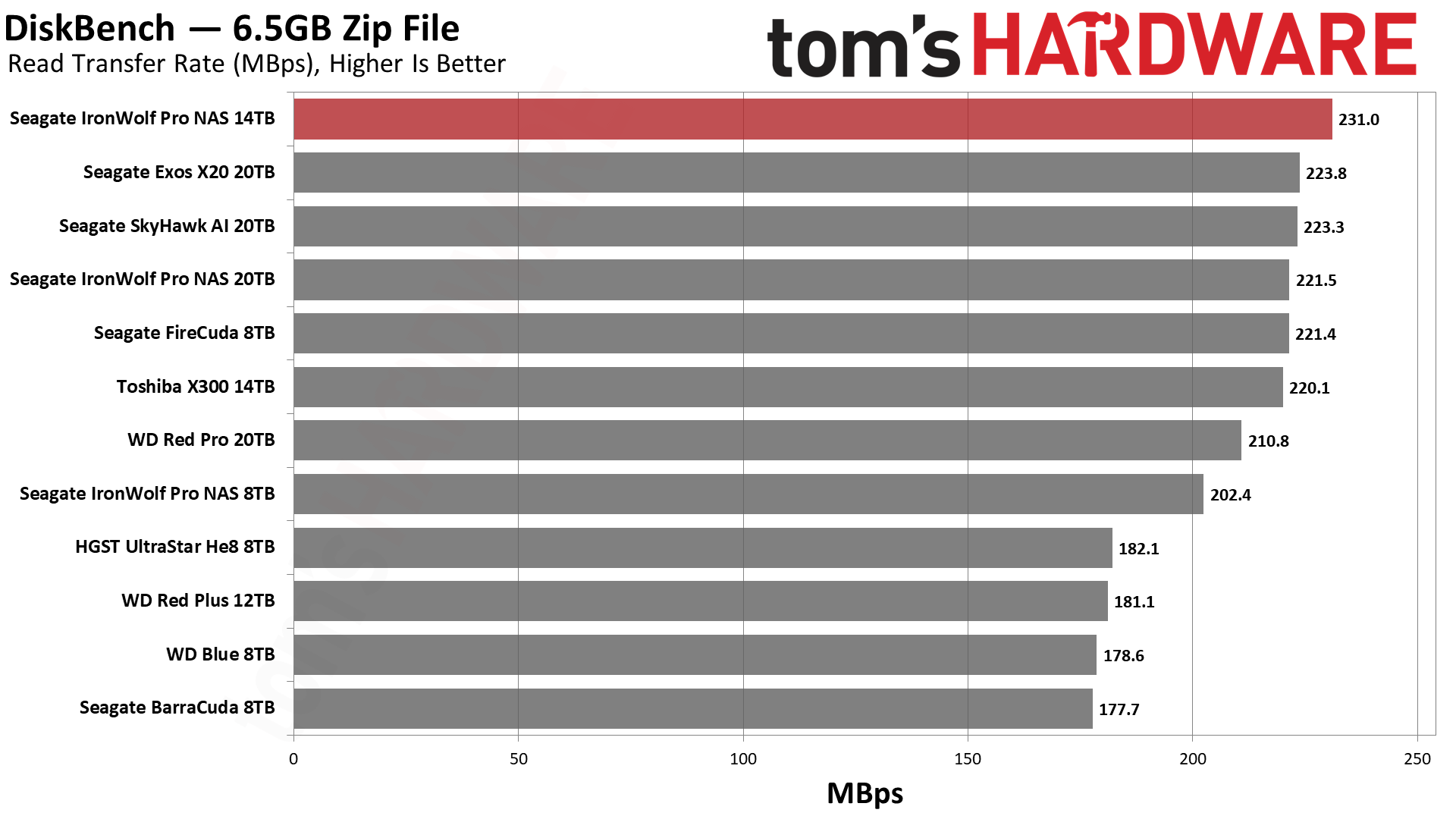
While reading back our files, the IronWolf Pro's performance is excellent as it takes the lead over competitors, but file copy performance is mediocre. Given its capacity, this is not a terrible result, but the FireCuda again appears to be the better option for daily desktop PC use.
Synthetic Testing - ATTO / CrystalDiskMark
ATTO and CrystalDiskMark (CDM) are free and easy-to-use storage benchmarking tools that storage vendors commonly use to assign performance specifications to their products. Both of these tools give us insight into how each device handles different file sizes.

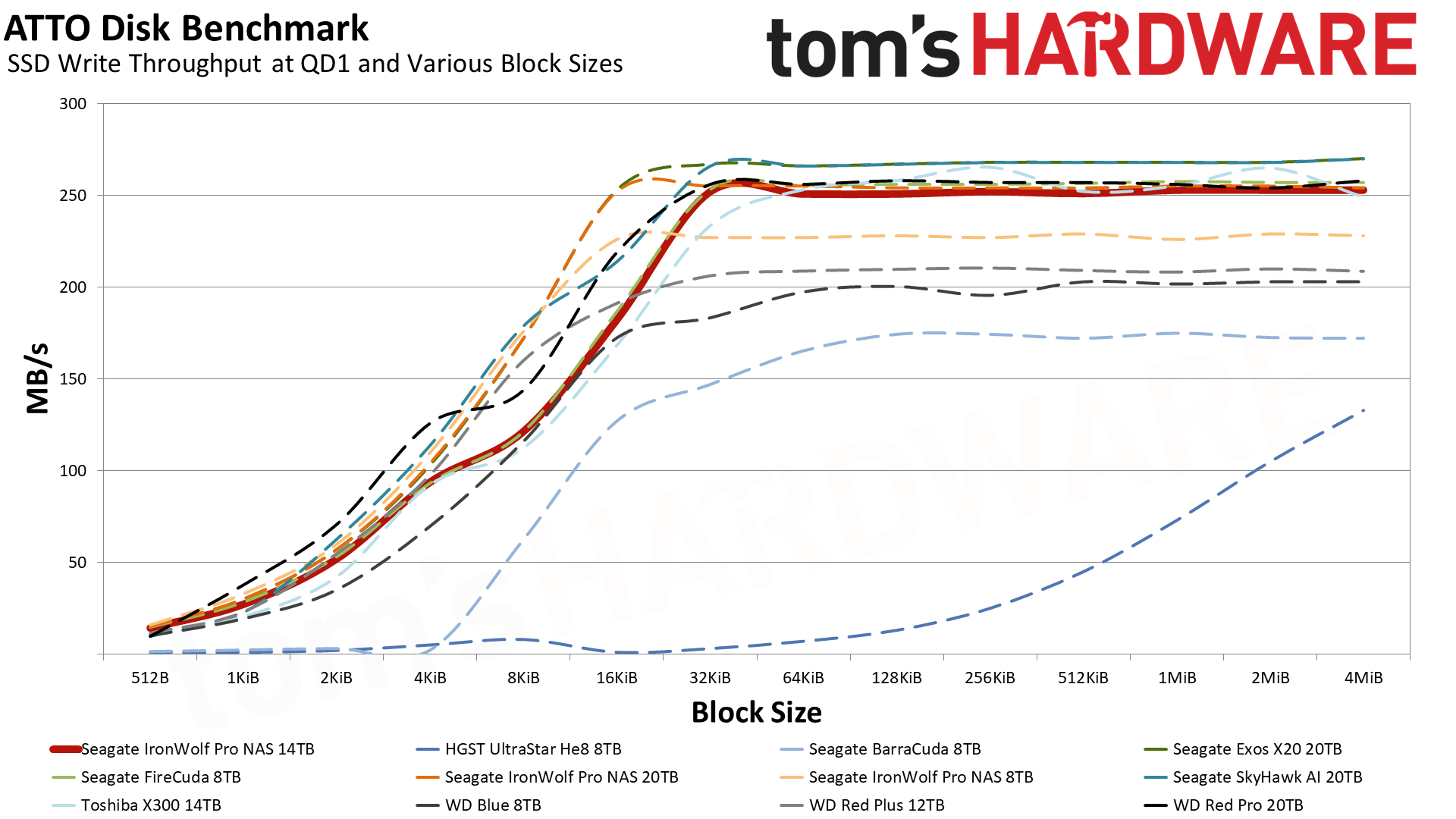

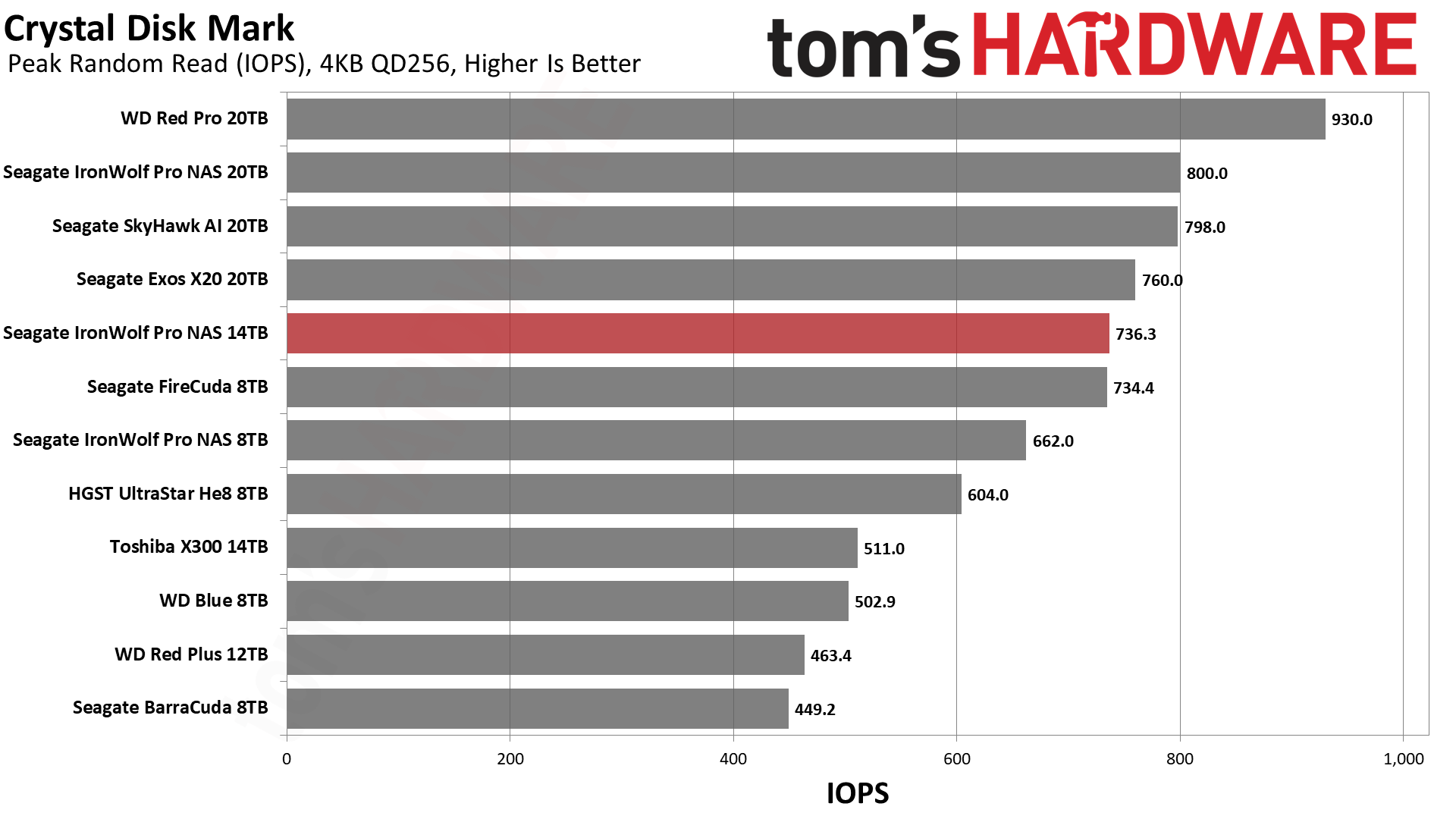
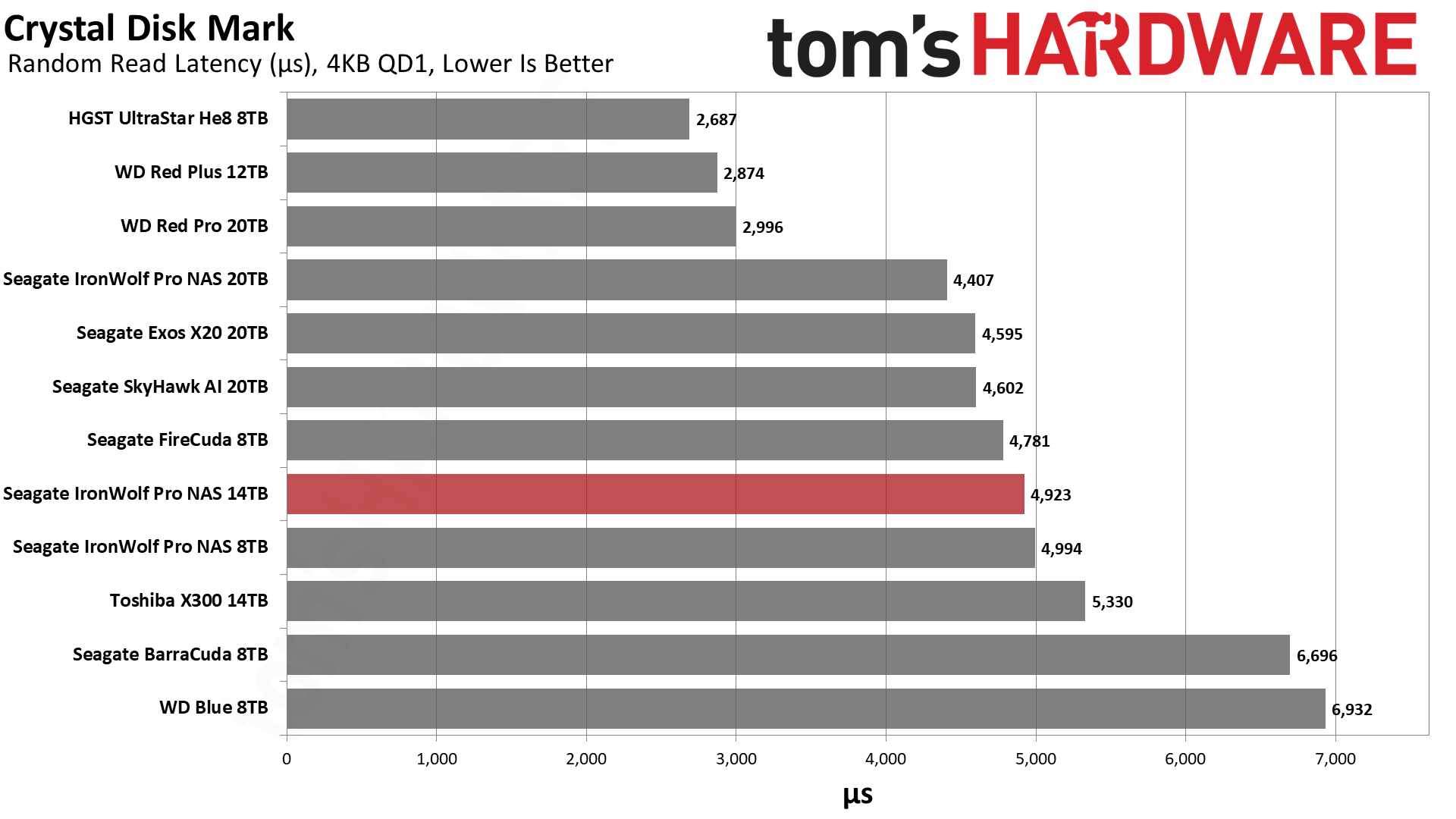

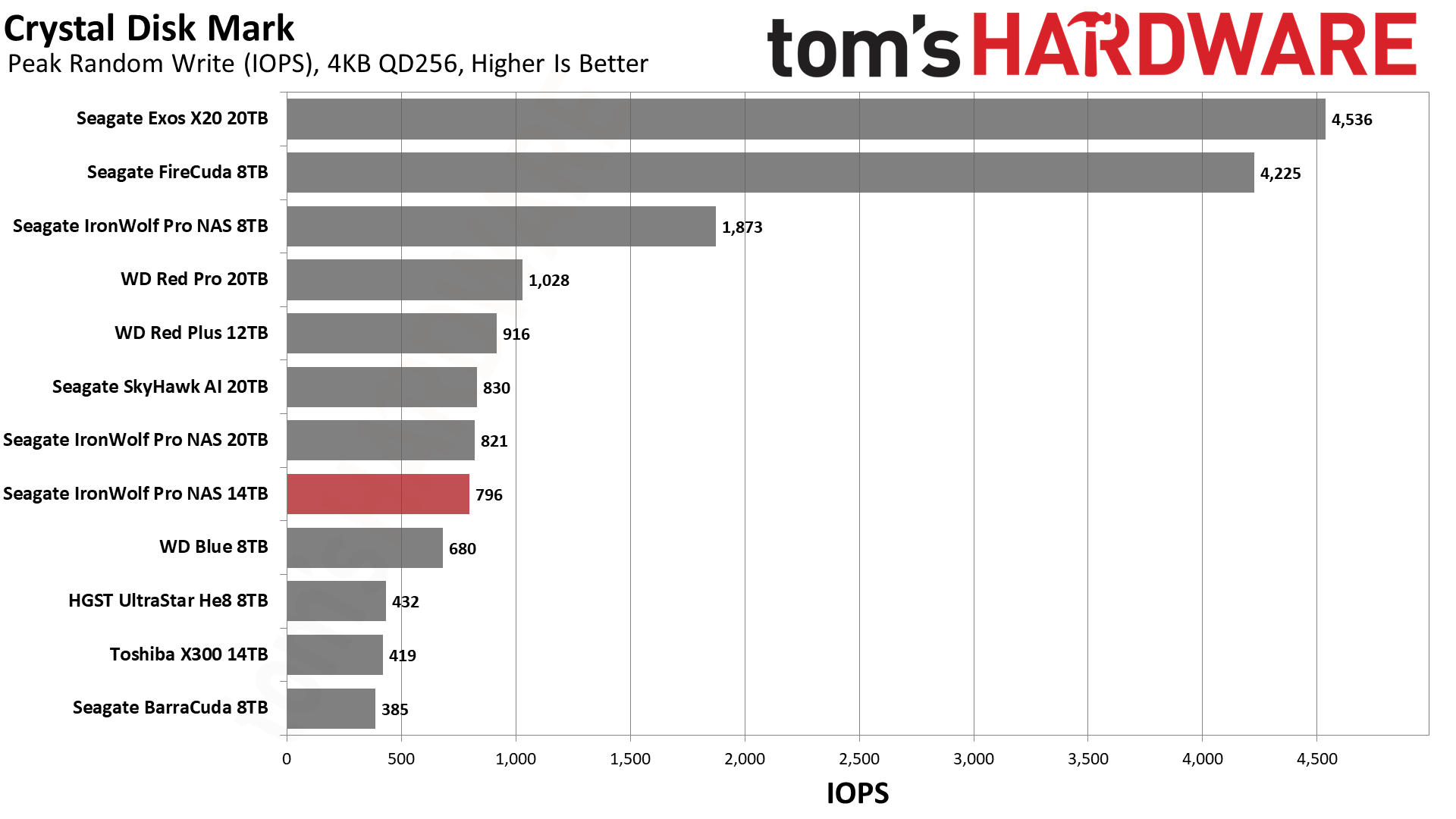
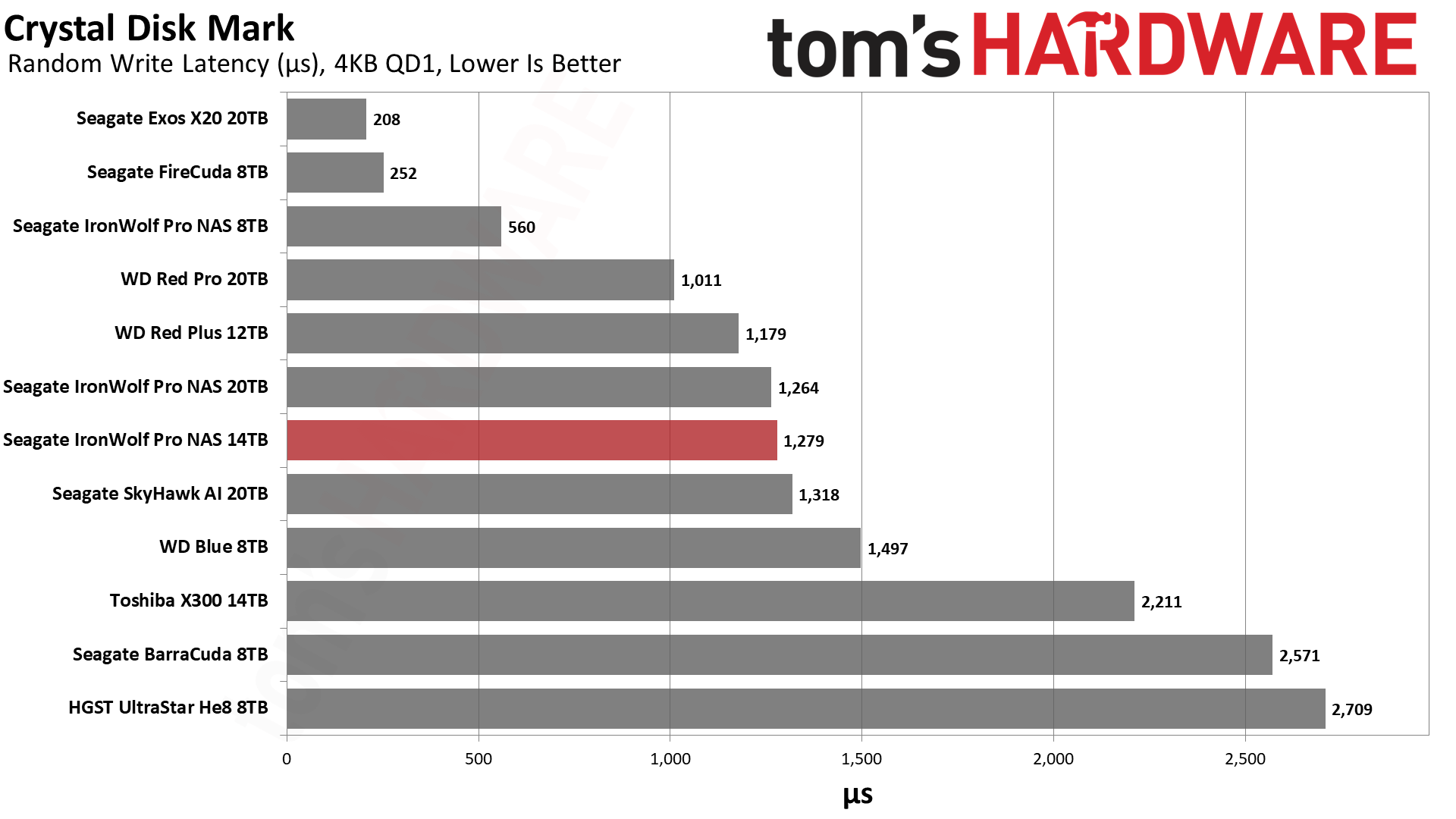

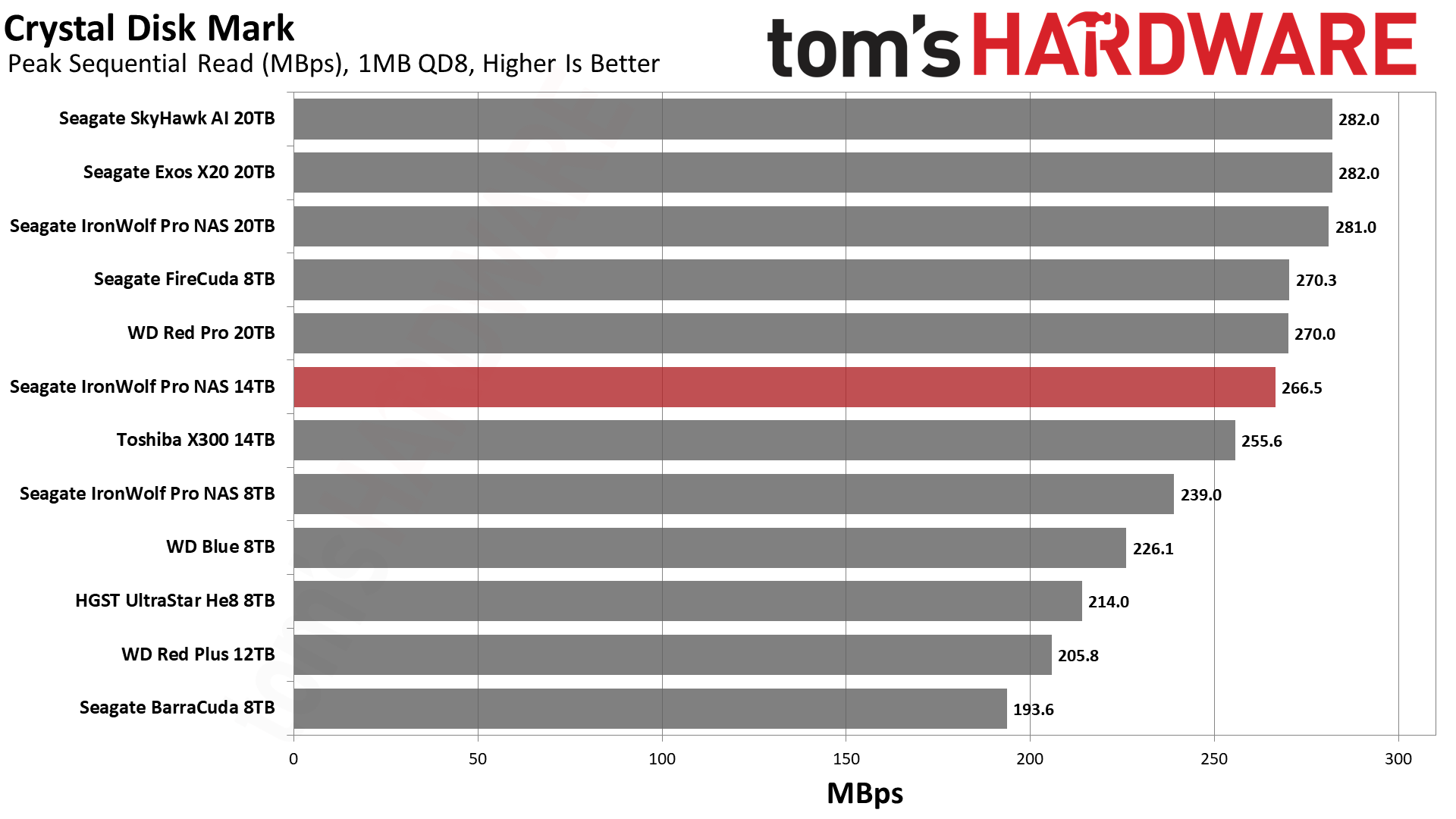
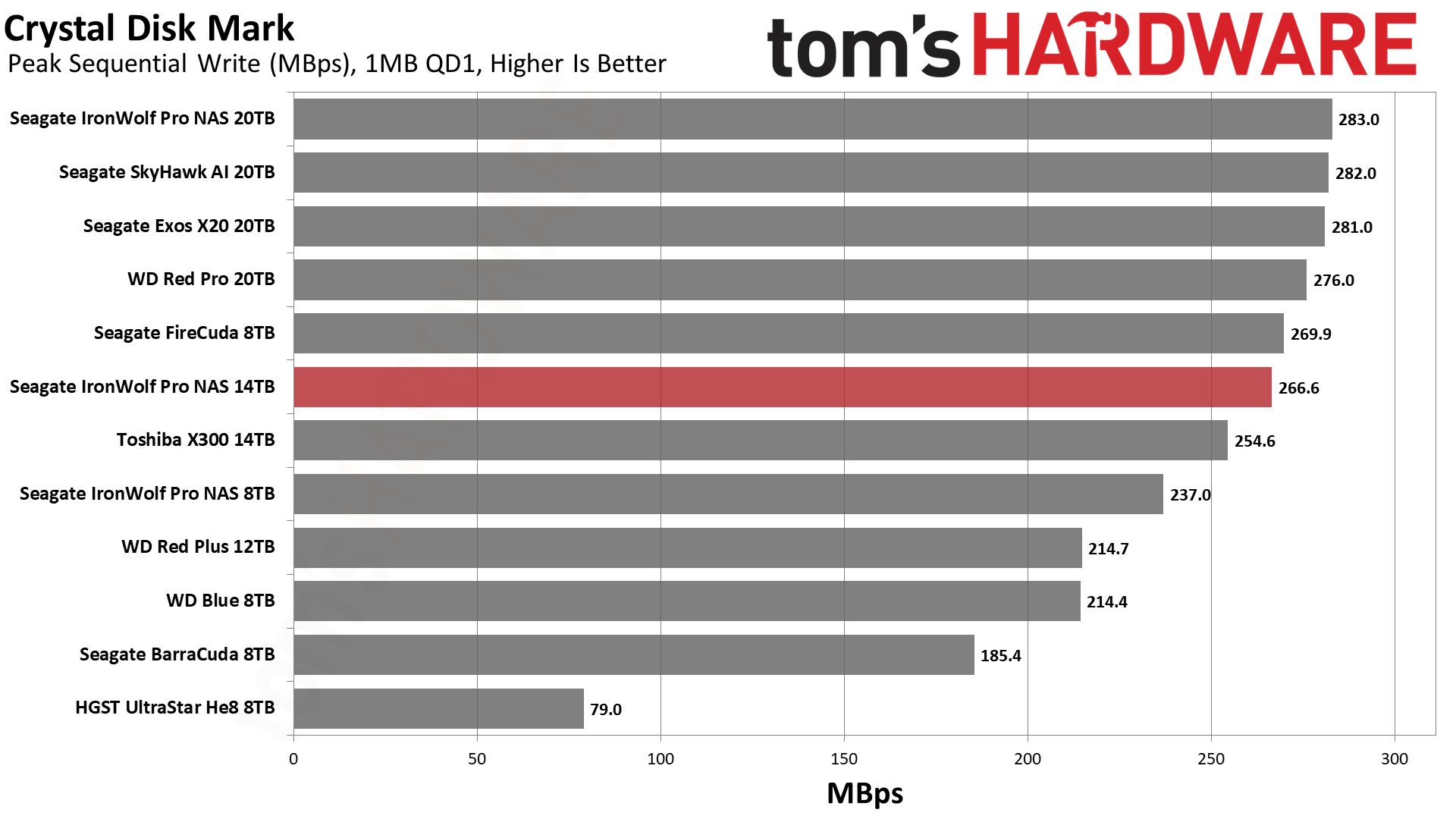
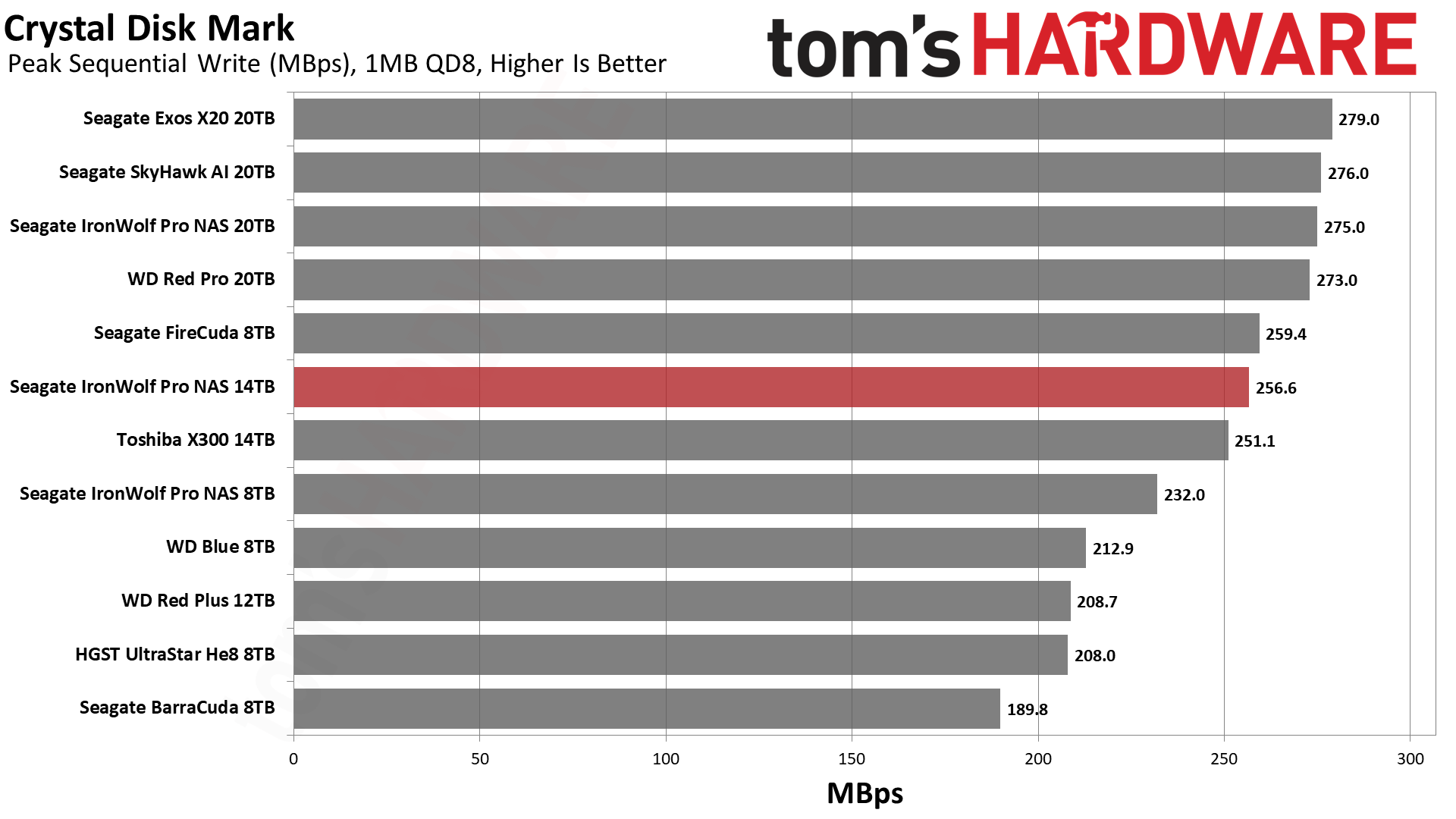
The IronWolf Pro's sequential performance is good in ATTO and Crystal Disk Mark. Again, the biggest surprise is the FireCuda, an excellent desktop HDD. Performance in random workloads is a different story, but the IronWolf Pro still manages to fall somewhere in the middle. This is one area where the Red Pro will likely remain dominant over the IronWolf Pro.
Sustained Write Performance
Official write specifications are only part of the performance picture. Most HDDs implement a write cache which is a fast area of volatile memory such as DRAM. Sustained write speeds directly hit the platters and tend to be consistent. There are exceptions to both of these statements, as there are SSHDs (flash-containing hybrid HDDs), OptiNAND drives, and SMR drives that deviate from the traditional configuration. We use Iometer to detect the maximum sustained write speed of the HDD.
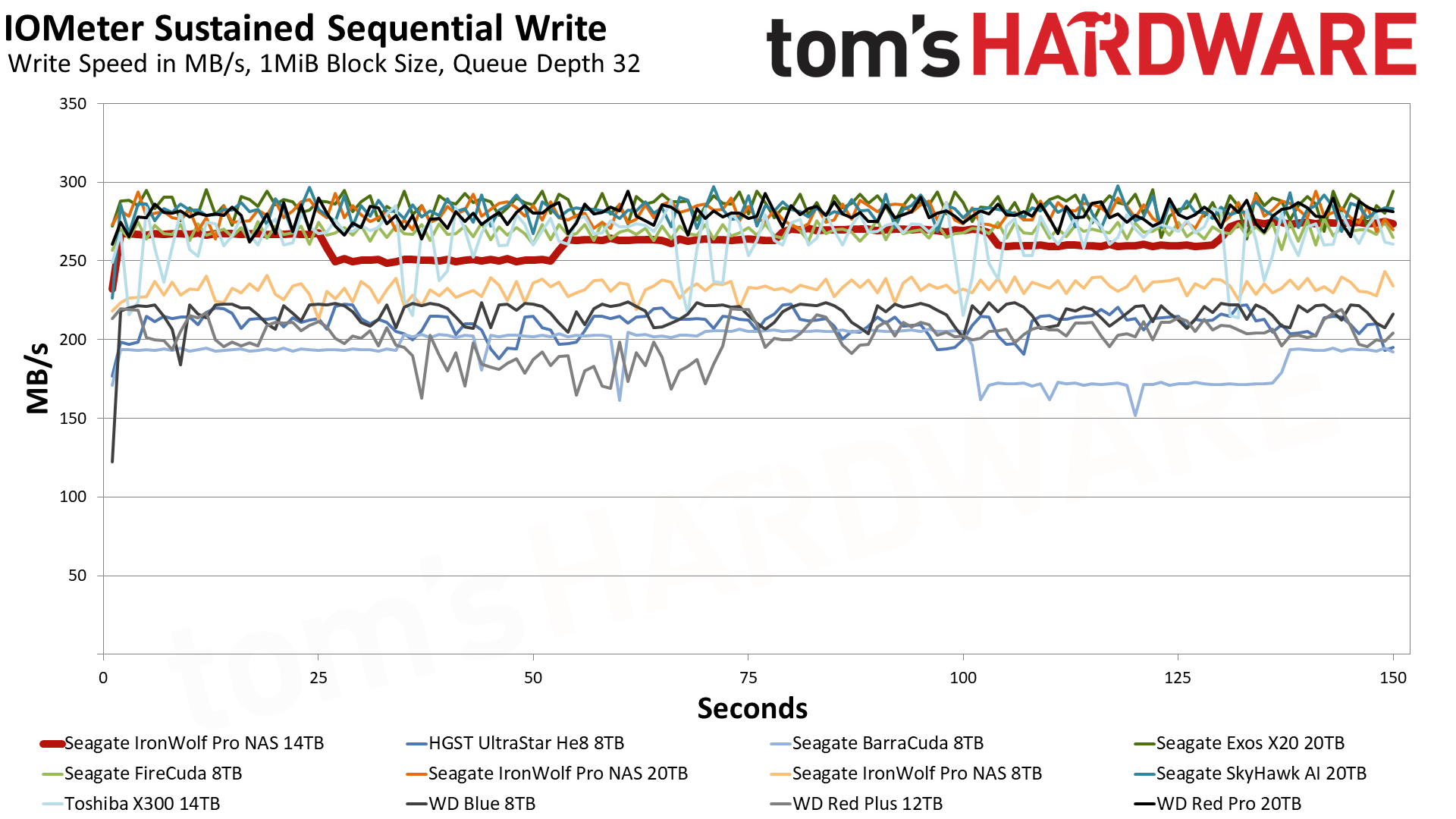
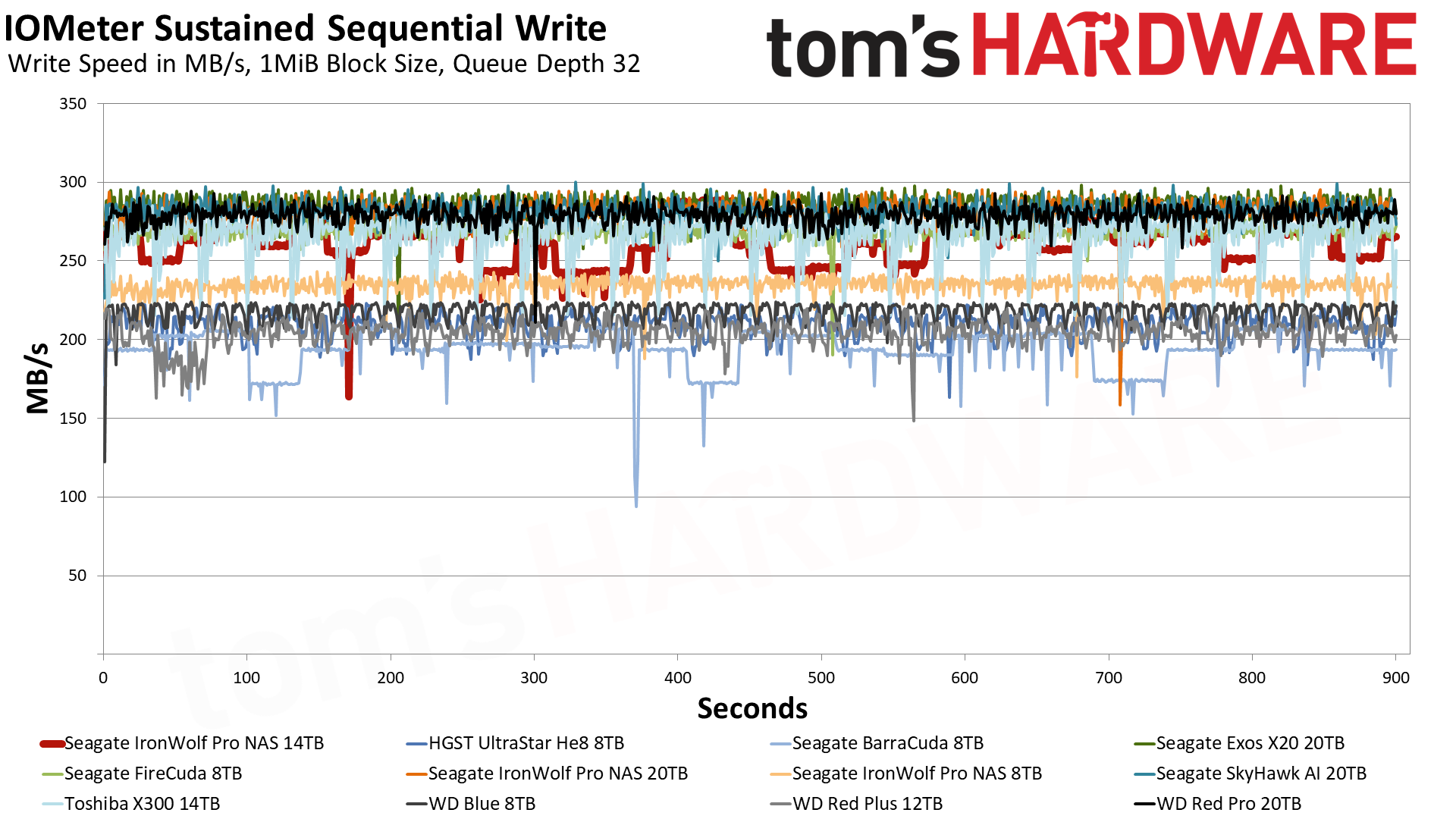
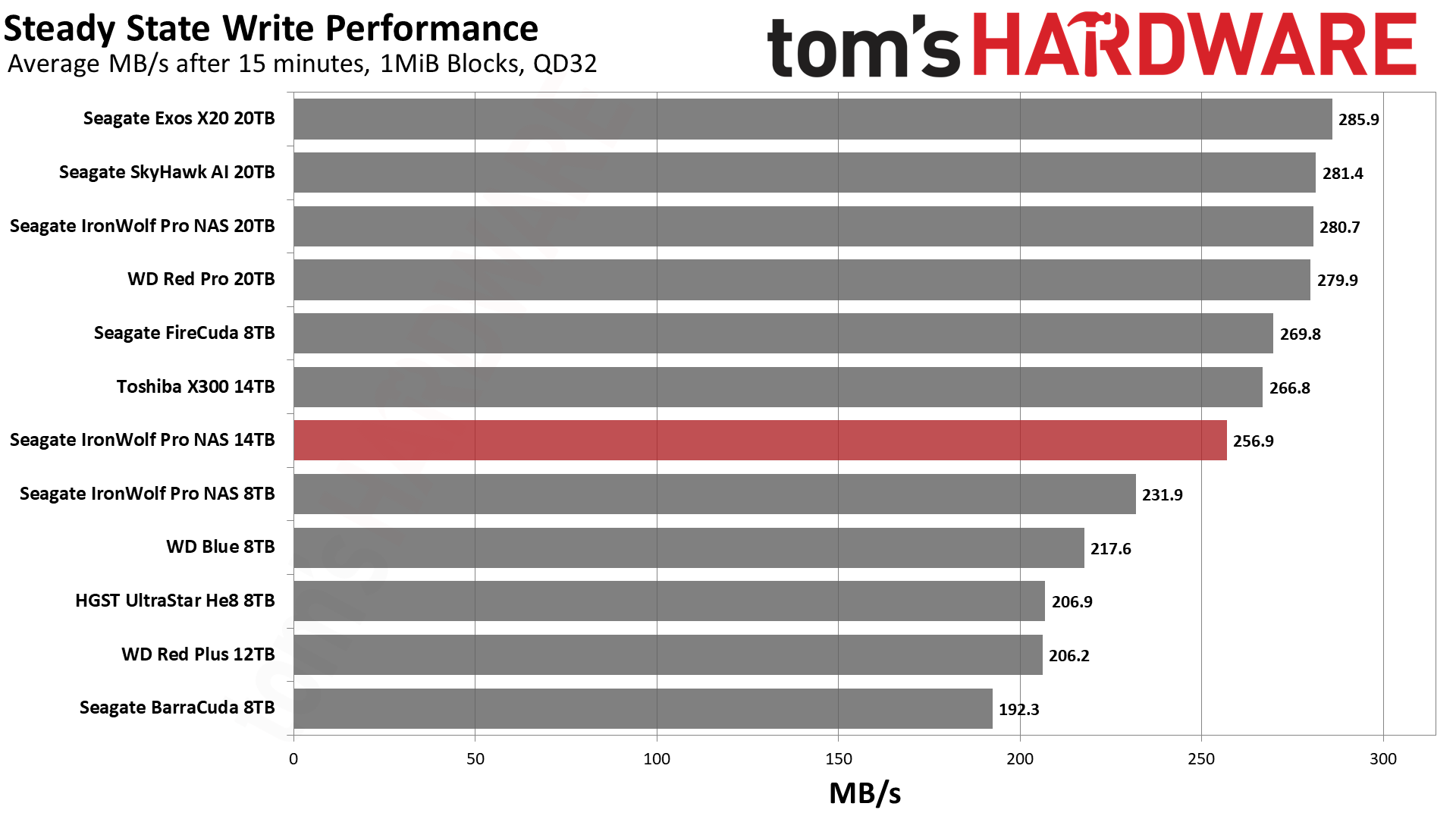
Sustained write performance is sufficiently good on the IronWolf Pro, and it reaches its specified 255 MB/s and maintains that speed with little variation due to its CMR technology. This is a significant advantage over SMR-equipped drives, like the 8TB Seagate BarraCuda, that suffer from inconsistent performance.
Power Consumption
We use the Quarch HD Programmable Power Module to gain a deeper understanding of power characteristics. Some drives can consume watts of power at idle, while better-suited ones sip just milliwatts. Average workload power consumption and max consumption are two other aspects of power consumption, but performance-per-watt is more important. A drive might consume more power during any given workload, but accomplishing a task faster allows the drive to drop into an idle state more quickly, ultimately saving energy.

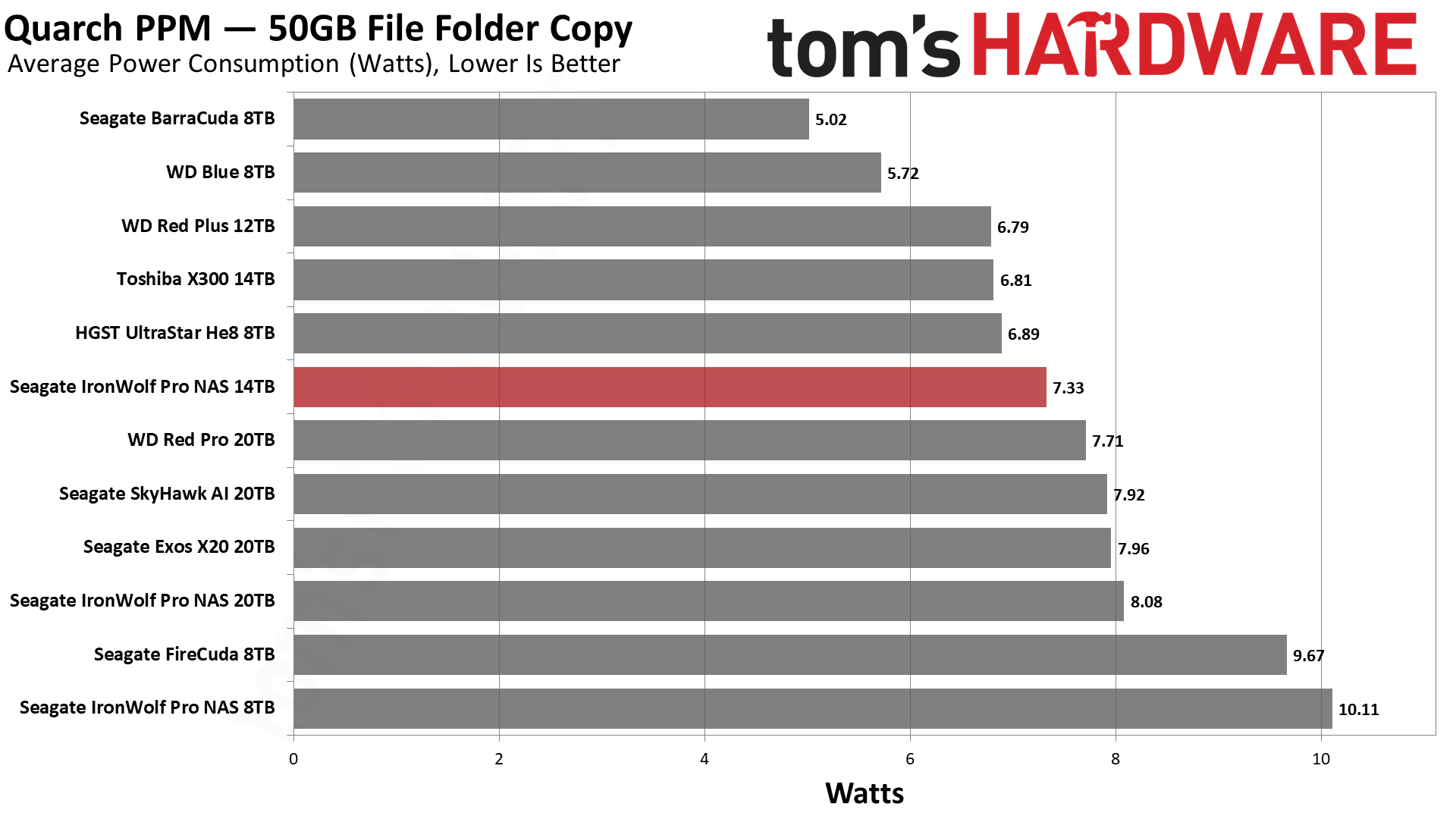
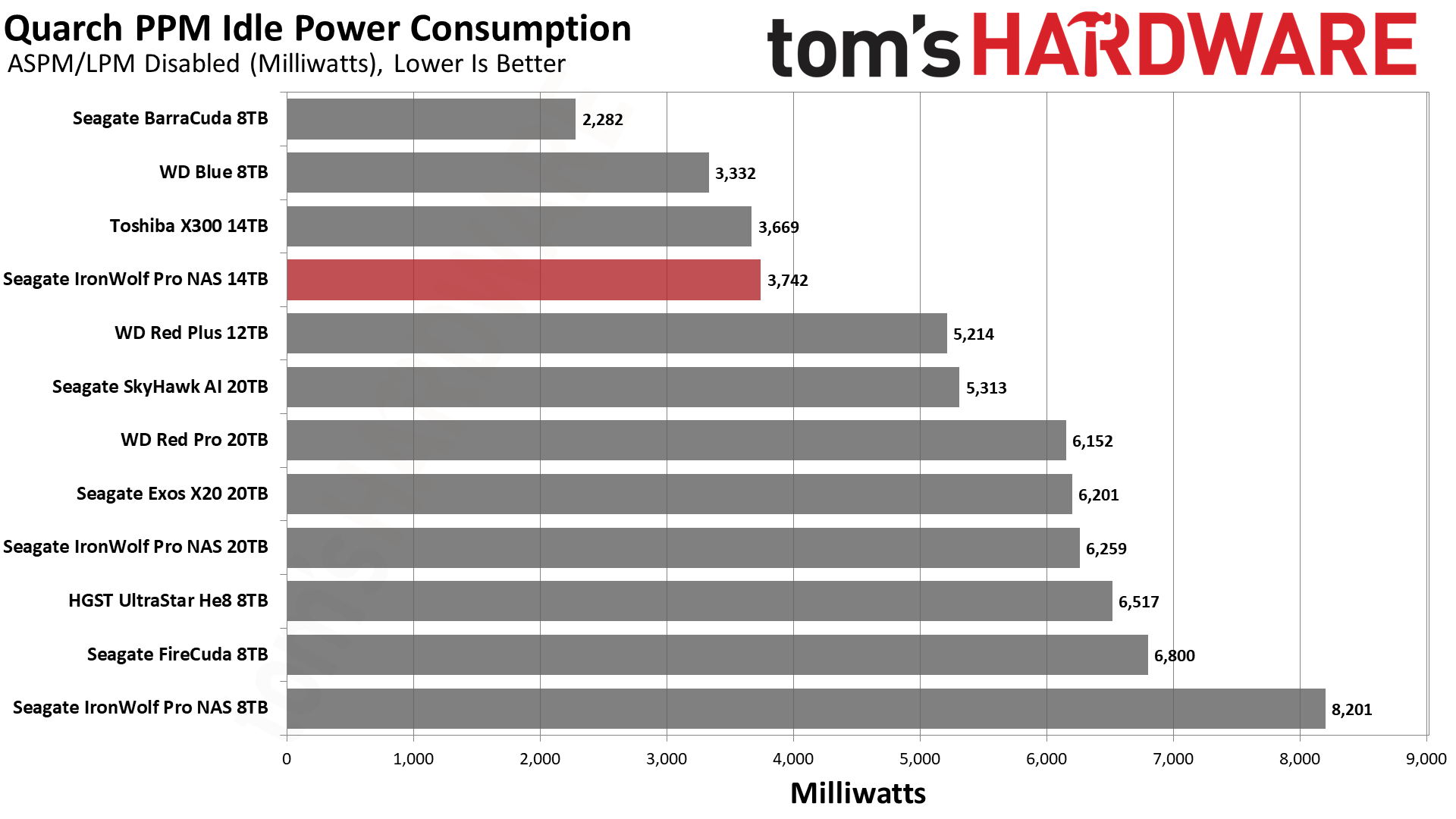
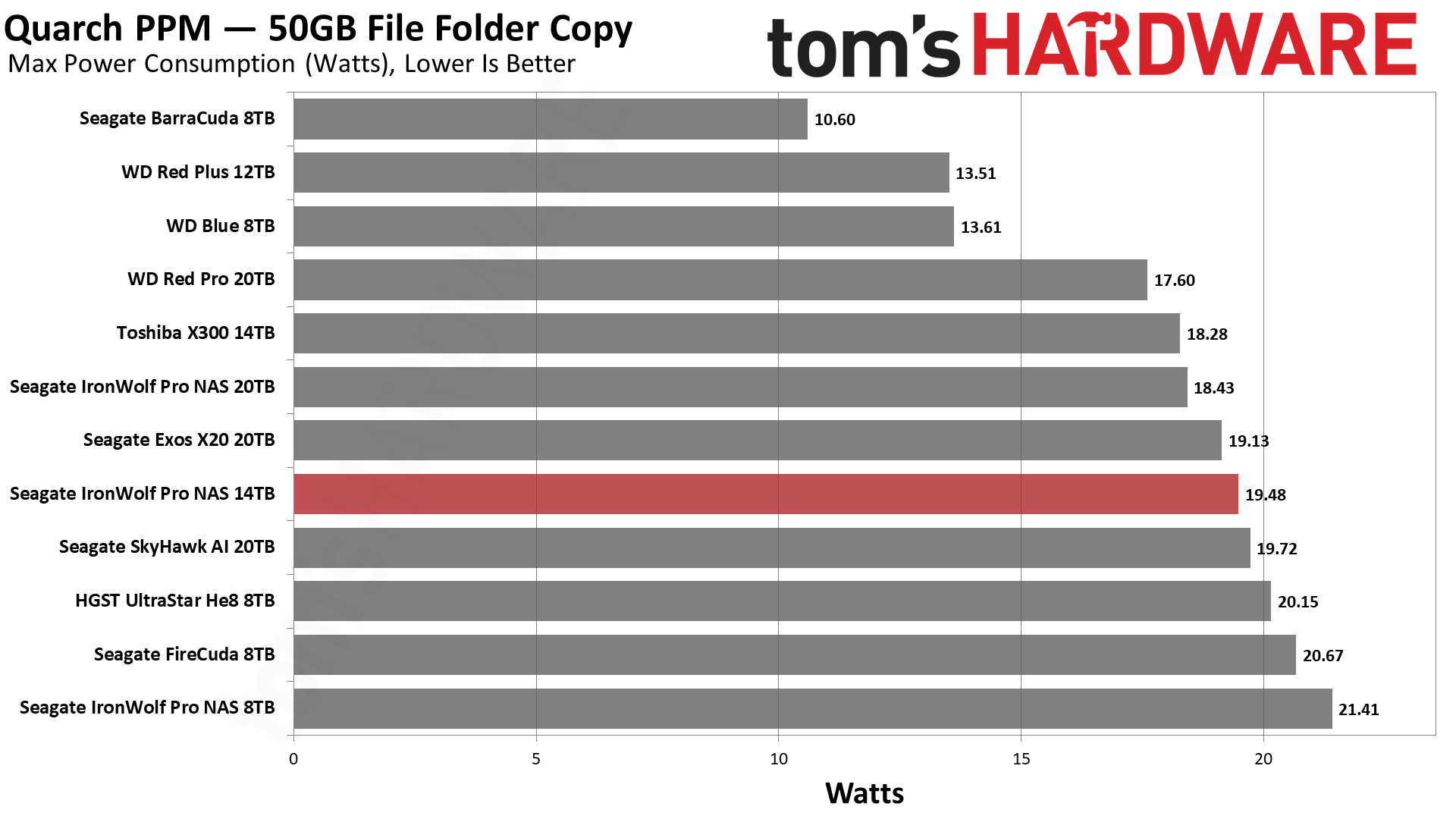
The IronWolf Pro’s power results fall where expected for a 14TB hard drive, and its efficiency is fairly good, being close to the 12TB Red Plus. There’s little not to like about this drive.
Test Bench and Testing Notes
| CPU | Intel Core i9-12900K |
| Motherboard | Asus ROG Maximus Z790 Hero |
| Memory | 2x16GB G.Skill DDR5-5600 CL28 |
| Graphics | Intel Iris Xe UHD Graphics 770 |
| CPU Cooling | Enermax Aquafusion 240 |
| Case | Cooler Master TD500 Mesh V2 |
| Power Supply | Cooler Master V850 i Gold |
| OS Storage | Sabrent Rocket 4 Plus 2TB |
| Operating System | Windows 11 Pro |
Conclusion
Even though it's designed primarily for NAS, the Seagate IronWolf Pro is a solid all-around drive. The IronWolf Pro's performance is not incredible, but it's good enough for its capacity, and Seagate's support for this drive is excellent. Current pricing, particularly for the 14TB model, is quite competitive.
The Seagate FireCuda is the better desktop PC hard drive, but it is only available at up to 8TB of capacity. Alternative hard drives at 14TB seem less compelling, whether NAS or not, with only the WD Red Pro being an alternative option for NAS.
If you want more capacity for your desktop PC, it's difficult to recommend the Toshiba X300 over the IronWolf Pro. The BarraCuda Pro is the better choice, but it currently costs more than the IronWolf Pro. The lesser NAS drives, like the regular non-pro IronWolf and WD Red Plus, are workable but lack the full warranty and recovery service. The Red Pro is still in play with its 512MB cache at 14TB and its better random read performance, but it is not without its own shortcomings.
Alternatively, the WD Black is a solid choice, depending on pricing. One final alternative is Seagate's Exos series, but these drives are designed for enterprise environments and have the price tag to match. The IronWolf Pro is the better compromise for use in a NAS, or a desktop PC for that matter. Seagate's IronWolf Health Management and data recovery services are an advantage that others simply don't match. We can easily recommend the IronWolf Pro for high-capacity applications, although the FireCuda is the better option for desktop PCs if you can get by with 8TB of capacity.
MORE: Best SSDs
MORE: Best External SSDs and Hard Drives
MORE: How We Test HDDs And SSDs
MORE: All SSD Content

Shane Downing is a Freelance Reviewer for Tom’s Hardware US, covering consumer storage hardware.
